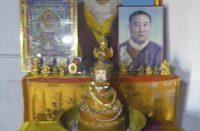High Peaks Pure Earth has translated a blogpost by Woeser written on June 23, 2013 for the Tibetan service of Radio Free Asia and published on her blog on August 6, 2013.
The post is about Woeser and her husband Wang Lixiong’s house arrest that took place in June 2013, around the same time that the Chinese government was preparing to take foreign journalists on an orchestrated trip to Tibet. Woeser had been placed under house arrest earlier in the year in March. Woeser had been one of ten recipients of the U.S. Secretary of State’s 2013 International Women of Courage Award but was barred from travelling to Washington DC to receive the award and was also placed under house arrest.

On June 19, in Beijing I agreed to do an interview with a German journalist who was preparing to go to Lhasa. This, in addition to my meeting with an American diplomat on June 17, was enough to put me and my husband under house arrest for many days…
House Arrest for the Sake of Eliminating Any “Noise”
By Woeser
Various media reported on me and my husband being put under house arrest twice in June this year. The first time, in early June, was related to June 4. The second time, in mid-June, was related to a visit of foreign diplomats and foreign media to Lhasa. Actually, I did not know at the time which diplomats were going to Lhasa, all I knew was that some members of foreign media outlets were visiting Lhasa.
More or less every year such performances are put on, basically an arrangement for journalists from different far-away countries. They benefit the United Front because those journalists who don’t know anything about China and even less about Tibet are arranged to praise the “New Tibet” of China’s Party leaders. Sometimes foreign journalists who are based in Beijing fight to get the opportunity to go on one of those trips, too. They are very aware that unless they join such groups of journalists arranged by the Chinese government, they have no way of entering Lhasa. But of course, once they do join in, they will only hear and see about the kind of Tibet that the Party wants to present; and this kind of Tibet is merely a facade.
So, some journalists who were not willing to be manipulated did their preparational work before entering Tibet, which included interviewing me. The local authorities, however, were very alert, on June 19, after I had just met a journalist, seven or eight policemen and national security personnel took action and put me and my husband under house arrest; for many days we were totally cut off from the outside world and could not meet anyone at all. So are the foreign journalists going to hear and see happy stories of Tibetans when the authorities behave like this? The local authorities are extremely afraid of the truth in Tibet, the whole picture becomes all too obvious from just this one incident.
Judging from the usual practices of previous similar fantastic dramas that have been staged, once the foreign journalists arrive in Lhasa, all military police that fill the streets take off their uniforms and put on ordinary clothes pretending to be tourists. The snipers on the rooftops are not sent on holiday but they hide, one can only see their wide brimmed black hats appearing every now and then. But as for the monitoring grid that controls the entire city and its people, it actually becomes ever-more pervasive.
A foreign journalist once told me that many foreign media outlets have applied to the CCP to be able to enter the Tibet Autonomous Region (TAR) many times but have always been refused. The reason for refusal has been, “because the local Tibetan government does not trust foreign journalists”. This false apology is a way for them to say that there is nothing they can do, it is the local government that decides after all. But this reason, of course, is not true at all, as if the local government of the TAR was already independent! As if the local TAR government was more powerful than the central government in Beijing!
A netizen left the following sarcastic comment on Twitter: “In China it is all servants-turned-masters who have power; real masters, of course, have nothing to say. Relative to the central government, the TAR government is a servant… and one cannot use the way of thinking of normal people to understand the words and deeds of the servant government.”
According to reports, the Chinese Ministry of Foreign Affairs criticised foreign media: “Why do western journalists have such prejudices against the Tibet policies of the CCP? It is a bit like a wedding, a beautiful bride sits in a room but everyone just wants to focus their attention on the rubbish bin.” This metaphor is food for thought. Who is that beautiful bride? And who is the concealed groom? And who is the rubbish bin? Yet, since the Chinese government believes that western media only focus on the rubbish bin of Tibet, why do they still so carefully arrange visits of foreign journalists to Lhasa? Is the sublime goal to “cure the sickness and save the patient”? The foreign journalists who recounted this experience said that at the time, they were all very shocked that the Chinese government used the comparison of a rubbish bin to refer to Tibetans.
A netizen wrote on Twitter, “If the journalists knew that it was not only the Chinese government, but many Chinese people who also think like this (that Tibetans are rubbish), they would be even more shocked. Those who shout out ‘unite the new democratic China’ are not prepared to let any non-Han people be part of this new China, there is only sinicisation, anything else is a dead end.” Another netizen wrote: “Even interviews have to be meticulously arranged, this is enough to prove that there is no so-called ‘truth’ and no so-called ‘freedom’ in Tibet.”
“How many different kinds of disguises really exist?” Actually, the many patrolling military police suddenly changing their uniforms into normal clothing is very ordinary, it often happens. But what is surprising is that sometimes they would put on robes or traditional Tibetan garments or they would wear white hats pretending to belong to the Hui minority. But Lhasa people have long been used to this, they jokingly say: today, China is really too wealthy, they even provide the young soldiers who are there to protect us with at least five different kinds of costumes and five different kinds of identities.
June 23, 2013





Follow Us!